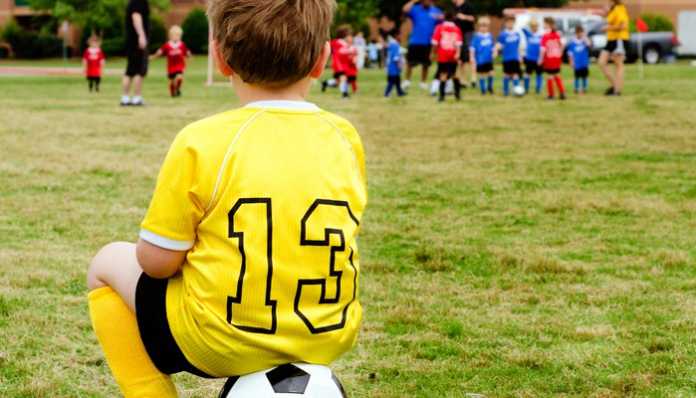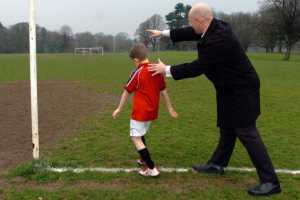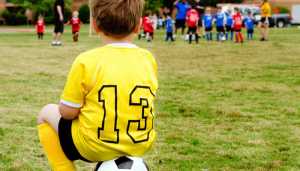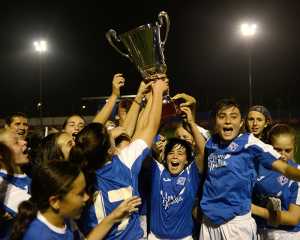
The special one

This was our chance, my chance. I was free, in acres of space, the entire left-wing to myself. All it would take was a simple through-ball, the kind of pass he could make in his sleep. I stuck one hand in the air then the other, waving furiously. The pass didn’t come. Instead he moved into troubled waters, towards a pair of surly centre-backs, ready to dispossess or maim him, whichever was easiest. I shouted in his direction, whooped, hollered, now jumping up and down in desperation. How could he not see me? I was right there.
But my efforts were in vain. Ignoring the thin, wiry winger in space, our commander-in-chief bore down on the opposing defenders, shimmied, shaped to shoot, and lost the ball, his face connecting painfully with the rock-hard turf as he fell to the ground. I watched on, dejected, not even bothering to track back and stymie the counter-attack. What was the point?
Because this wasn’t the first time this had happened. I’d barely had a touch all game. It had been the same the week previous, and the week before that. I’d had enough. Sod them all. Not even bothering to announce my departure, I simply stepped off the pitch and went home. One or two of them called after me, but they weren’t really bothered. My contribution to the cause was negligible, they could manage without me.
This display of petulance, although unforgivable at senior level, can be explained by my tender years. I was only eight. I believed in the beautiful game, believed that the joy of scoring a goal, of winning a game, was something available to all little boys. It wasn’t. Not then and not now.
I never went back to play for that team. In fact, I mostly only played football for fun thereafter. I knew I wasn’t good enough to make a difference, would only ever be making up the numbers. So I opted out, accepted that Fergie would never come calling, and got on with my life.

There’s a parenting section on the Irish Times website, a place where concerned mammies and daddies can write in to the resident expert for advice on bringing up baby in these troubling times. This week’s query, which, at one point, was the second most read story on the entire site, relates to a child not unlike my eight-year old self – although in this instance the poor fecker can’t even get on the pitch, and can only dream of being ignored by more talented team-mates.
His parent (it doesn’t state which one it is) describes being unable to manage their “anger, frustration and utter gut-wrenching hurt” as junior is continually overlooked, left to stand in the cold while younger boys are selected in his stead. While accepting that this is undoubtedly a “hard life lesson” for their son, the parent concludes their lament by expressing anger at the coach of the team for “excluding” their child.
The resident expert, Dr John Sharry, offers a lengthy, equivocal and wisely diplomatic response, suggesting that the over-encumbered child drop down a level or find a different sport completely. He also recommends that the parent be there to emotionally support their child no matter the outcome and no matter the path he takes. Sage words, entirely becoming of man who has authored a book entitled Bringing Up Happy Confident Children. Yet it’s an altogether more brusque passage which the anxious parent should pay most heed to.
“Competition is essentially focused on separating winners from losers, and those with sporting ability from those who don’t.” Those aren’t my words, but those of Dr Sharry, co-developer of the Parents Plus Programmes. The sadist in me kind of wishes he’d responded with that sentence alone, a bare, bleak message to parent, child and humanity itself: Life is hard, get used to it.
This isn’t another withering assessment of ‘Generation Snowflake’, a pithy reminder that “in my day we walked 38 miles to school every day in our bare feet, ate bits of moss for our dinner and still turned out grand.” But it is a shot across the bows of parents like the one above, parents who are just too damn invested in their children’s lives. Like Declan Cooke, for instance, the Cork father who sued his son’s soccer team after he was dropped from the starting line-up.

In truth, Mr Cooke exists at the far end of the spectrum. His is an extreme case. But that kind of mentality, one where a parent cannot accept that their progeny might not fulfil their destiny, stems from an environment we all have created. An environment where children are routinely shielded from life’s harder realities, where they are assimilated into adult routines at an unnecessarily young age, and continuously analysed like lab rats lest they occasionally show signs of developing into something not quite what their life-givers had hoped for.
I witnessed the true nadir of this fabricated environment on a television documentary recently. The programme featured a dozen or so young children, separated into groups of four, tasked with choosing charities to donate an arbitrary sum of money to. One, an earnest young man no older than five, turned everyone’s hearts to goo by selflessly, nay, nobly, choosing a cancer charity because his grandmother had recently died of the disease.
Ordinarily my heart would have turned to goo also. But there was something horrendously contrived about the whole thing. This wasn’t an innocent kid acting on impulse as kids are supposed to. It was a self-aware, miniature adult performing to the crowd, a tiny, little child who should still have bits of snot hanging out of his nose, displaying the kind of sophisticated behaviour one isn’t supposed to learn until your teens. To some that may be cute. Me? I preferred it when kids were just kids.
More deadly than the male

Call me a chauvinist if you must, or even a Neanderthal, I honestly don’t mind, but I was staggered to learn that a team comprising solely of girls not only competed against thirteen boys teams in an under-fourteen division in Spain’s Lledia province, but actually beat them, winning the league outright, fair and square.
Time and time again I scanned the article, searching for the caveat, the giveaway, the piece of information which would explain this fantastical tale; the boys were blindfolded, the girls tricked them with promises of kisses and cuddles, angry parents charged onto the field any time the senoritas were tackled. But there was nothing. It was a genuine story, albeit one which my caveman brain couldn’t compute.
Once I’d recovered from the shock I mused upon the impact this would have on the chastened boy’s teams. And I decided it was a good thing. In losing to these girls they’d learned all they’ll ever need to know: That, for most men, life is all about feeling sad and sweaty while jeering women mock you for being such losers.


